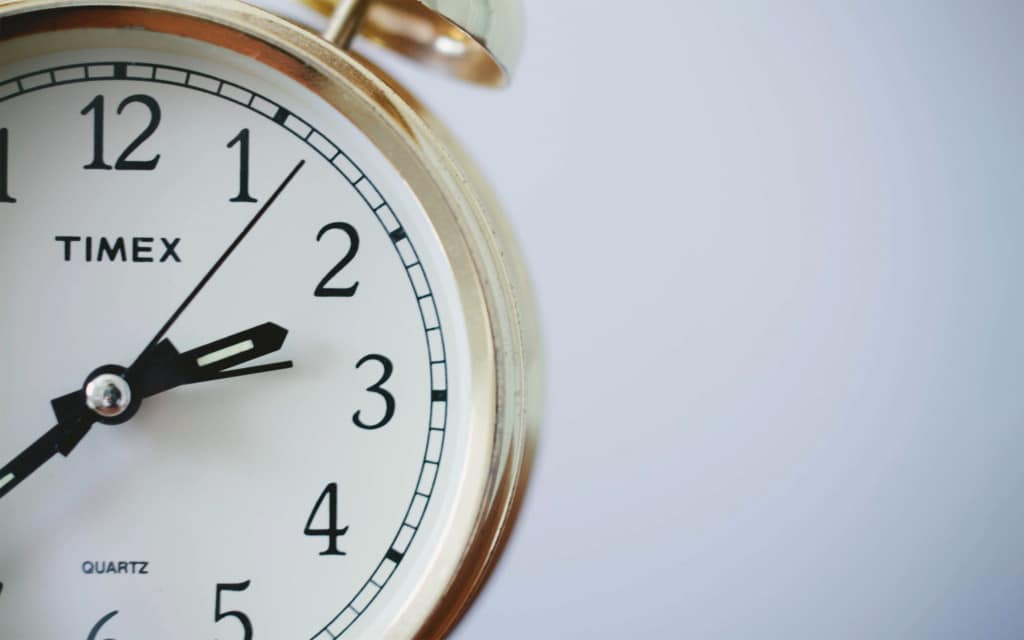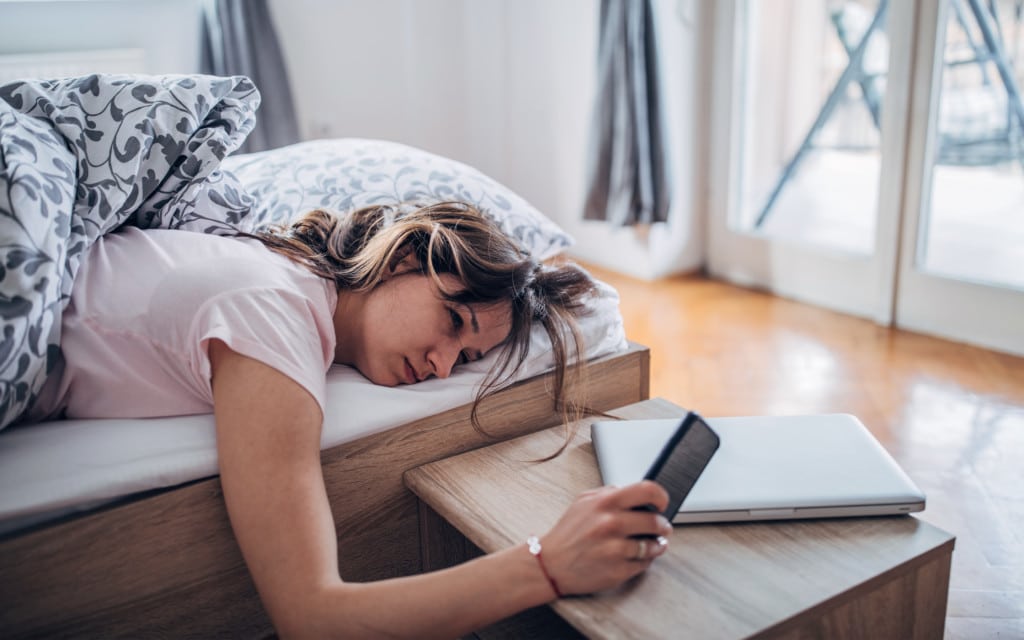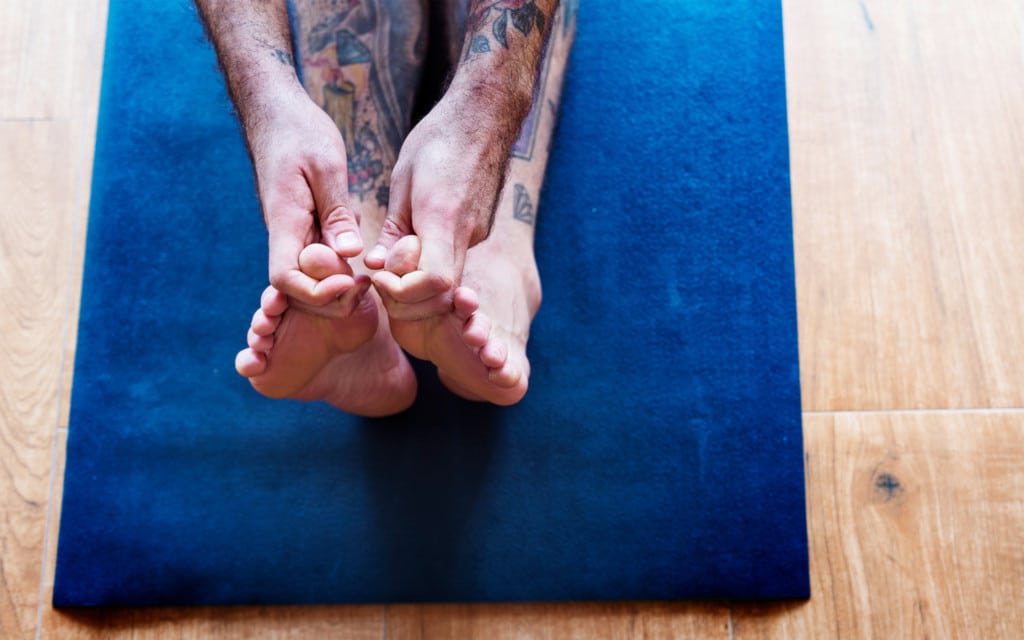It’s not just your alarm clock that has an impact on your sleeping patterns.
Your internal body clock has a part to play too.
The circadian rhythm, or the biological clock in your body that guides your sleep and wake cycles, is a crucial component of your health and wellbeing.
Unfortunately, the body clock can quickly fall out of sync when you expose yourself to travel, shift work, late-night Netflix binges, and countless other factors.
While most of us know that it’s essential to stick to a regular schedule to maintain good sleeping patterns — life can often get in the way.
Even if you try to go to bed at the same time each night, insomnia and other disorders could prevent you from getting the rest you so desperately need.
The good news?
You don’t have to live with a messed up sleep schedule forever.
Today, we’re going to show you how to sleep earlier and reset your sleep schedule and get that pesky circadian rhythm back on track. Let’s get started.

How to fix your sleep schedule: The basics
Many people find that they feel sleepy at approximately the same time each night, and even that they wake up at a similar time each morning.
As long as you’re not changing your sleep routine every other day, or traveling across time zones, you’ll probably get the same amount of sleep each night.
The reason for this is that your body has its own internal groove — a circadian clock that guides your sleep and wake behaviour. While the average sleep schedule does vary from person to person — we all have one.
The trouble is, your regular sleep schedule isn’t set in stone. There are plenty of things that can throw your timing off.
It can be exposure to light through the day and those evenings you spend on the couch instead of going to bed when you’re supposed to.
If you’re wondering how to fix your sleep schedule, you’re going to need to reset your entire body clock.
The master clock for your body is located in a specific part of the brain called the suprachiasmatic nucleus — found in the hypothalamus. It rules your circadian rhythm.
The body clock receives information from your eyes in the form of light. It uses that light to send messages to other parts of the brain, such as the pineal gland. The pineal gland is responsible for producing the sleep hormone, melatonin.
This means that the light signals we’re exposed to each day, have an impact on how well you sleep. Don’t forget, this includes the glowing computer and smartphone screens your eyes are glued to 24/7.
According to the National Institute of Health, your body clock doesn’t just regulate your sleep patterns either; it can also have an impact on your hormone production, emotions, and even your ability to manage your weight.

The problems with a messed up sleep schedule
Often, over time, your brain will start resetting your sleep schedule on its own. Think about how you adjust to a different time zone, when you come back from your holidays.
However, if you never get back into a regular routine, and keep changing your circadian rhythm every time a new show comes out on Netflix, that’s when problems start to arise.
Although your brain and body are very resilient, there are many things that can make it challenging to stick to a regular routine — and consistency is key for good sleep.
For instance, nightmare disorders, changing shifts at work, and the demands of looking after a child can all lead to a messed up sleep schedule.
People who often work overnight tend to have severe problems with their sleep, because they’re always falling asleep at different times.
Having an inconsistent sleep cycle is problematic because it leads to poor sleep quality. You might end up getting a few hours of shut-eye when you eventually lay down on your bed.
The risks are that you won’t get the right kind of sleep to support the creative and productive parts of your brain. Studies have found that problems with sleep schedules link to issues like diabetes, depression, obesity, and even bipolar disorder.
A sleep schedule that’s messed up is a sleeping disorder in itself, according to the National Sleep Foundation.
Around 1% of adults have something that experts call “advanced sleep phase disorder.” This means that they don’t stick to the same routine for regular sleep patterns.
Other individuals suffer from something called “delayed sleep phase syndrome“, where they regularly wake up late and go to bed extremely late too. The “delayed sleep phase” condition is particularly common among teenagers, and can lead to chronic issues with sleep deprivation, depression, and poor cognitive performance.
So, the question is, how do you go about resetting your circadian rhythm in a natural and safe way? After all, the chances are that you don’t want to be reliant on medication and over-the-counter drugs to overcome your issues with insomnia.

10 Tips on resetting your sleep schedule
If you’re wondering “How do I fix my sleep schedule?”, you’ve come to the right place.
Falling into the rhythm of a sleep schedule that’s not working for can be a dangerous and exhausting thing. Fortunately, there are many things you can do to get yourself back on track with a more regular sleep schedule.
Here are 10 tips on how to reset your sleep cycle to get you started.
1. Start early and sleep earlier
Most people working on resetting the circadian rhythm start by trying to go to bed earlier. However, the chances are that you’re not going to feel tired enough to fall asleep if you’ve been getting up at the same time as usual.
Forcing yourself to go to bed when you’re not tired doesn’t improve your chances of a good night’s sleep. Instead, it just increases your risk of issues like sleep anxiety as you struggle to fall asleep.
A better option is to start by getting up slightly earlier than you usually would. Start slowly so that the change isn’t too difficult. For instance, if you’ve been getting up at 11:30am, set an alarm for 11:00am instead and stick to that routine for a week, then set your alarm for 10:30 and so on.
When you start getting up earlier, gradually begin moving your bedtime to 15 minutes earlier every day. Please read on to find more extensive knowledge on this matter later in this article.
2. Wake up to natural light
When you’re changing your sleep schedule, getting up earlier than usual can be tough, so it’s a good idea to make sure that you’re setting yourself up for success. If you don’t get sufficient light at the appropriate time of day, it could de-synchronize your internal body clock.
Make sure that you walk to the window and open your blinds as soon as you get up. If possible, walk outside and soak up some real fresh air and sunlight. Even fifteen minutes of exposure to the sun is enough to improve your circadian rhythm.
The natural light of the sun tells your brain to shut off melatonin production and start cortisol production, helping you to wake up. This also gives your body a point of reference to work from when determining when you should feel awake, and when you should be sleepy.

3. Work on relaxation
Learning how to reset your sleep cycle isn’t easy. It takes time and focus to change your sleeping patterns, so it’s important to have a way to help yourself manage emotionally. Making some time in your routine for relaxation — particularly before bedtime, will help you to sleep better.
Calming activities like drinking natural teas and yoga will all help you to overcome the feelings of anxiety you may have about adjusting your sleeping patterns. A regular evening meditation can be crucial to your regular sleep schedule routine. Teaching your mind when it’s time to wind down.
4. Avoid over-exposure to caffeine
If you’re dealing with a messed up sleep schedule, there’s a good chance that you’re going to feel sleepy throughout the day. You might be relying on certain stimulants like caffeine to keep you awake.
The urge to drink energy drinks and countless cups of coffee can be strong — particularly when you’re dealing with the mid-afternoon slump. However, the more caffeine you drink, the more your circadian rhythm suffers.
Ideally, you should avoid drinking any caffeine after lunchtime, if any at all. If you’re particularly sensitive to this kind of stimulant, it might be a good idea to stop drinking it even earlier. Instead, try waking yourself up with a brisk walk, or drinking plenty of water.
5. Skip the naps
Ask any expert how to reset your sleep schedule, and they’ll tell you that you need to be diligent. That means that no matter how much you want to enjoy a nice relaxing nap during the day when you’re not at work, you need to keep yourself awake. Naps can be great when you need to refresh your mind from time-to-time, but they also make it harder to get to sleep when you want to.
If you really must nap, set an alarm, so you don’t sleep for more than 20 minutes. This will prevent you from moving into the deeper stages of sleep that could leave you feeling groggy when you wake up.

6. Get plenty of daily exercise
Figuring out how to change your sleep schedule also means learning how to adapt your daily plan for the better. Getting regular exercise is an excellent way to improve the performance of your body clock. Your muscles are linked to your biological clock, which means that more exercise can help to align your circadian rhythm.
Around 30 minutes of moderate exercise per day will improve your sleep quality the night after. You’ll also find that you get better results if you commit to exercising regularly. Just make sure that you don’t exercise too close to your bedtime, as this can raise your adrenaline levels.
7. Try changing your food schedule
Your internal body clock has an impact on your hunger as well as your sleeping patterns. This means that metabolism and digestion may also play a role in your feelings of sleepiness and wakefulness. When you eat and what you eat might help with resetting your internal clock. According to Harvard researchers, fasting for around 16 hours could be a great way to reset your circadian rhythm.
Consider eating an early dinner at around 4 pm and avoid eating any new food until you wake up and eat breakfast at 8 am the following morning. Once you’ve got your sleep back on track, you can stick to regular eating times to support that consistency.

8. Pull an all-nighter
In general, staying up all night isn’t a good idea. However, if you need to know how to fix your sleep schedule after travelling to a new time zone or starting a new job, going without sleep for a while could be the way forward. There’s not a lot of specific research on this strategy for overcoming sleep disorders, but pulling an all-nighter forces you to realign your sleeping patterns.
Just make sure that you know how to recover from your all-nighter once you’re done. This means eating the right foods and drinks to keep your body fueled.
9. Make yourself comfortable
Resetting a sleep schedule isn’t easy, but it’s even harder if you don’t have the right tools to help you. A comfortable bed and a good sleeping environment is crucial to a good night’s rest. Make sure that when you do go to bed each night (or day), it’s in a setting that’s conducive to good sleep. This could mean investing in a new mattress, getting black out blinds, or even using a natural light clock to help you wake up and wind down each day.
Remember that your body temperature can also have an impact on how well you sleep. Make sure that your bedroom is cool, and free from any nasty odours or distractions.
10. Stick to your sleep schedule
Finally, once you find a rhythm that’s right for you, it’s essential to stick to it. In other words, don’t just hit your snooze button all of the time because you feel sleepy when you wake up. Additionally, make sure that you continue to go to bed and get up at the same time each day — even on weekends.
The more you tell your body that your schedule doesn’t matter by changing your routine every time you have a day off work, the more your internal rhythm will suffer. You need to be strict with yourself if you want your sleep schedule to work.

How to go to sleep earlier
“Early to bed and early to rise, makes a man healthy, wealthy, and wise”.
We are supposed to be awake when it’s light outside and asleep when it’s dark. Light is the most potent agent to synchronize your internal body clock that regulates circadian rhythms, which in turn also regulate energy balance.
When University of Toronto researchers surveyed about 700 adults on their sleep habits, mood, and health, they found that morning people (who naturally get up around 7 or earlier) had up to a 25 percent increase in feelings of happiness, cheerfulness, and alertness.
Figuring out how to go to sleep earlier is difficult for a lot of reasons. For instance, different people need different amounts of sleep, so you might think you need to change your sleep pattern because you’re only getting 6 hours — but if you’re getting them early enough, there’s no problem.
The key to successfully getting a good sleeping pattern in place is making sure that you’re getting the right amount of sleep at the right time each day. Then wake up feeling refreshed.
Your body is fixing the damages of the day, getting rid go toxins and waste products. This happens mainly in the hours from 10pm to 2-3 am.
As mentioned above try adjusting your bedtime by just 15 minutes a day. Try giving your digestive system a rest by not eating 3 hours prior to bed. Do use the recommended methods in the 10 Tips on resetting your sleep schedule.
Earlier sleep has a huge amount of benefits. People are happier, have lower body weight and more balanced hormonal systems. Earlier sleep enhances the chances of longer and deeper sleep.
You should be able to get through the day without feeling drained or exhausted.
Early sleep and a sleep schedule that you stick to consistently is how you ensure that you’re always getting the right amount of sleep to reinvigorate your mind and repair your body.
Just to summarize:
- Poor sleep has adverse effects on brain function, exercise performance, and hormone production.
- Poor sleep increases disease risk and weight gain in children and adults.
- Good sleep helps you to maintain better health and wellbeing.
- The right amount of sleep can improve your chances of weight loss.

How long does it take to adjust to a new sleep schedule?
Crucially, even with a guide on how to reset your sleep schedule, it’s worth noting that you might not see the benefits of your efforts over-night.
The length of time it takes for you to adjust to your regular sleep schedule will depend on what caused your circadian rhythm to falter in the first place.
For instance, if you’re just changing because you’ve been in a different time zone for a while, then you might only take a day to get back to normal.
If you have a condition like delayed sleep phase syndrome, which has caused a more long-term issue with your sleeping patterns, resetting sleep schedules can take a lot longer.
It depends on how deeply your new pattern is entrenched into your behaviour. Some people can take months to get back on track, particularly if you’ve been dealing with poor sleep for quite a while.
Just remember that you’ll need to follow some essential sleep hygiene principles during and after you reset your body clock to improve your chances of long-term success. That means:
- Sticking rigorously to your plan.
- Giving yourself plenty of time for early and adequate sleep.
- Making sure you don’t vary your sleep schedule too much.
- Creating a relaxing night-time routine.
- Avoiding distractions when you go to bed.
- Eating the right foods and not too much before bed.
- Making sure that you think positively about sleep.
- Keeping your bedroom quiet, dark and cool.
If you’re struggling to make a difference to your sleep schedule after a couple of months and improving your sleep hygiene doesn’t help, there may be a deeper reason for your issues.
You might want to reach out to a doctor or sleep specialist to see of something like sleep apnea could be causing your circadian rhythm issues.
Changing your sleep schedule is how you make sure that you’re getting the rest you need each night to prepare you for a happier and healthier life. Want to find out more about making the most of your sleeping patterns? Don’t forget to subscribe to Siestio.
Siestio. Sleep Matters.
General advice disclaimer
This article contains general tips and advice. However, no diet or exercise program should be started without consulting your physician or other industry professional first. For more information read our full disclaimer here.







